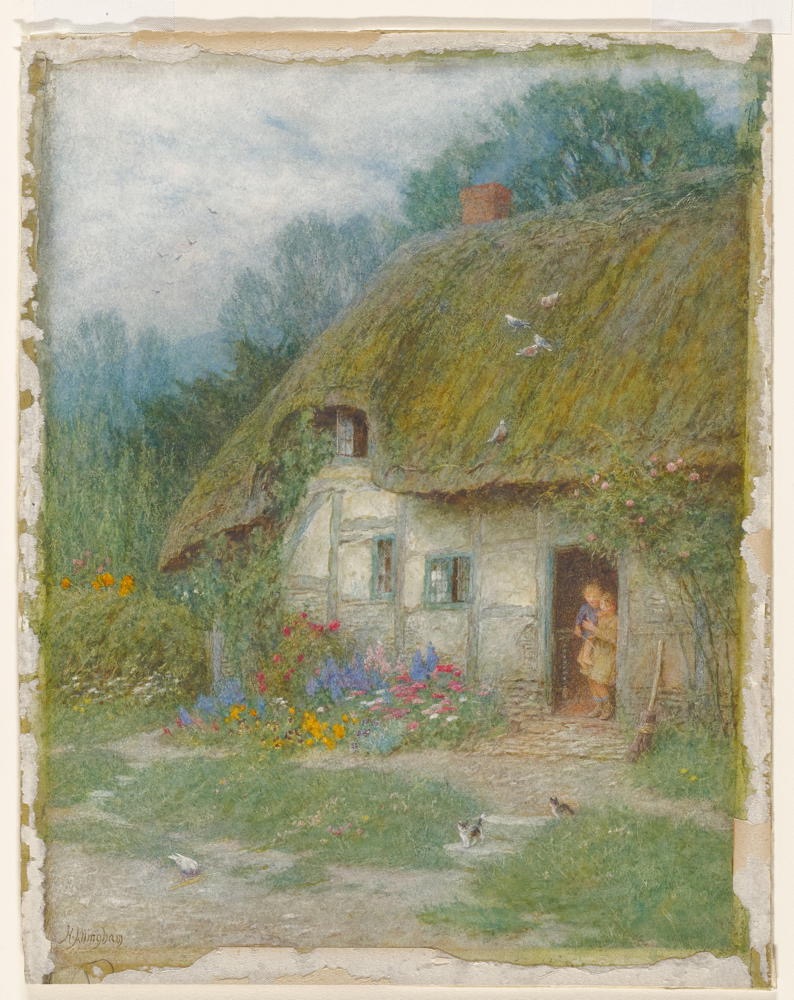CottageIndustry

Helen Allingham: A Wiltshire Cottage (19th-20th century)
While Vincent van Gogh was developing as an artist by studying English illustrated journals, he was struck by Paterson's work in The Graphic. Although females could not gain the same recognition as men at the time, Helen Allingham was one of the women artists who made a considerable impact, as she influenced artists like Van Gogh. -Wikipedia
—
" … on legs that vividly remember stumbling."
Processes, how people accomplish things, have long fascinated me. By my own admission, I have been mainly critical of "process," if only because I felt that organizations generally took the notion too literally. They'd pose then enforce strict rules as if only those could produce such curious results as consistency, most often still the hobgoblin of the weaker minds. They'd likewise strive for other attributes perhaps only suitable for large-scale industrial processes, applying these to wildly different contexts. In these ways and many others, managers would subvert the actual benefits of processes by strictly enforcing some naive notions about what constituted them. Popular method-ologies (method descriptions raised to religious veneration) further degraded the intention, as successive generations were trained to interpret their processes in this primitive manner, as if that result represented progress.
We've seen the effect of processes run amok in just these ways, most disturbingly within CottageIndustry. A CottageIndustry embodies production at its most diminutive scale. It produces dozens of products rather than thousands. It often creates hand-made objects whose very being insists upon individual variation. No two should ever prove to be in any way identical. Tool marks should remain, if only to represent their authenticity. The meaning of process and productivity swerves furthest away from the industrial ideal when considering operations in any CottageIndustry. The theory books, though, remain stubbornly mute on the ethics and practices of such small-scale producers, and their routines continue to rely upon the subtle genius of their proprietors. However, any well-schooled process practitioner easily feels the need to offer utterly unusable and unnecessary advice. The CottageIndustry proprietor will be well-advised to turn a deaf ear to such assistance.
For instance, the Muse's Port Commissioner campaign will produce only one ultimate product: an electoral win. However, it must engineer innumerable minor successes to achieve that one end. It's primarily a community-building machine rather than a typical physical raw material transformation engine. It started with the simple phrase The People For and meant it. This guiding term helped define the campaign's earliest production ethics, contributions would fuel it. This meant that she would not fund the effort if adequate donations could not be raised. Though it might seem attractive to contribute whatever the machine might need, it would deliberately inhibit itself to prove a point and surrender if unable to realize that ideal. Her job, her process, became to meet with a wide variety of people and ask them for money, figuring that anyone who contributed treasure would gain motivation to help her get elected. So far, that decision continues to produce progress, though often of the cliff-hanging sort.
The campaign seems fortunate as it enters its final leg to have already made many mistakes. The opponent, who has yet to make much of an appearance, therefore, seems to have those mistakes still before her. I'm learning that any small city political process might be best advised to make as many mistakes just as early as possible so they can inform final operations. Nobody needs their learning curve tripping up their big final push. I've noticed each volunteer, too, adopting some small-scale process for their efforts. I have my own emerging small Canvassing business within which I observe my own collection of process definitions, each increasingly proving itself and becoming imperative. My first foray seemed fraught with frustrations, which, with iteration, became no more than minor distractions. I am becoming a more formidable machine, which might have always been the true purpose behind adopting any process.
It might be true that any CottageIndustry must design its own processes, for each faces unique contexts and considerations. If there's a universal component, and I believe there is, it necessarily focuses more on self-reliance than on strict adherence to any prescribed observance. This notion might prove paradoxical. I intend to suggest that any rule religiously observed might become the downfall of the CottageIndustry business and that each might more productively enculture their acceptance of an utterly unacceptable volume of waste in manufacture. Efficiency should never be the primary focus of anyone attempting to operate at less than industrial volume. Repetition remains a gratefully unrequited dream, too. We stumble forward before we ever learn to march and march on legs that vividly remember stumbling. We will never become mindless machines but still produce exquisite results.
©2023 by David A. Schmaltz - all rights reserved


